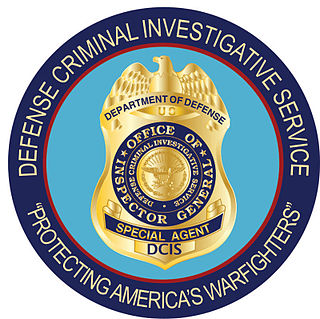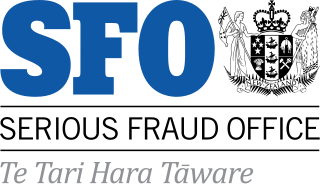In law, fraud is intentional deception to secure unfair or unlawful gain, or to deprive a victim of a legal right. Fraud can violate civil law, a criminal law, or it may cause no loss of money, property or legal right but still be an element of another civil or criminal wrong. The purpose of fraud may be monetary gain or other benefits, for example by obtaining a passport, travel document, or driver's license, or mortgage fraud, where the perpetrator may attempt to qualify for a mortgage by way of false statements.

The European Anti-Fraud Office is a body mandated by the European Union (EU) with protecting the Union's financial interests. It was founded on 28 April 1999, under the European Commission Decision 1999/352. Its tasks are threefold:

Valdecoxib is a nonsteroidal anti-inflammatory drug (NSAID) used in the treatment of osteoarthritis, rheumatoid arthritis, and painful menstruation and menstrual symptoms. It is a selective cyclooxygenase-2 inhibitor. It was patented in 1995.
Insurance fraud is any act committed to defraud an insurance process. This occurs when a claimant attempts to obtain some benefit or advantage they are not entitled to, or when an insurer knowingly denies some benefit that is due. According to the United States Federal Bureau of Investigation, the most common schemes include: premium diversion, fee churning, asset diversion, and workers compensation fraud. Perpetrators in these schemes can be insurance company employees or claimants. False insurance claims are insurance claims filed with the fraudulent intention towards an insurance provider.

The Defense Criminal Investigative Service is the criminal investigative arm of the Office of the Inspector General, U.S. Department of Defense. DCIS protects military personnel by investigating cases of fraud, bribery, and corruption; preventing the illegal transfer of sensitive defense technologies to proscribed nations and criminal elements; investigating companies that use defective, substandard, or counterfeit parts in weapons systems and equipment utilized by the military; and stopping cyber crimes and computer intrusions.
The Specialist, Organised & Economic Crime Command is a unit within the Gangs and Organised Crime group of Specialist Crime & Operations within London's Metropolitan Police Service. The unit's main responsibility is to both investigate and take steps to prevent fraud, along with a wide range of other fraudulent crimes which require specialist knowledge and training to investigate. The unit was previously known as the Fraud Squad, or by its previous Specialist Operations designation, SO6.
A Fraud Squad is a police department which investigates fraud and other economic crimes. The largest Fraud Squad in the United Kingdom is run by the City of London Police who are responsible for policing London's and the UK's main financial hub. The Fraud Squad is part of the City of London Police Economic Crime Department (ECD) It investigates what could be described as traditional fraud offences such as banking frauds; insurance frauds; investment frauds; insider dealing frauds; advance fee frauds and Internet frauds, amongst others. Each team is headed by a Detective Inspector who take it in turn on a weekly basis to act as the "Duty Squad" and they form the immediate response to any calls received concerning new fraud cases.
Odometer fraud, also referred to as "busting miles" or "clocking", is the illegal practice of rolling back odometers to make it appear that vehicles have lower mileage than they actually do. Odometer fraud occurs when the seller of a vehicle falsely represents the actual mileage of a vehicle to the buyer.
The Organised and Financial Crime Agency of New Zealand (OFCANZ), generally referred to as the Organised Crime Agency, is an agency hosted within the New Zealand Police. The agency's stated objective is to "disrupt and combat organised crime". The agency has been recently renamed the National Organised Crime Group (2018) however the objective remains as stated.
The Corner House is a not for profit company limited by guarantee founded in 1997 in the United Kingdom. According to its website, it aims "to support democratic & community movements for environmental & social justice"
Robert Tchenguiz is a British entrepreneur, securities dealer and the brother of Vincent Tchenguiz.

The National Fraud Intelligence Bureau is a police unit in the United Kingdom responsible for gathering and analysing intelligence relating to fraud and financially-motivated cyber crime. The NFIB was created as part of the recommendations of the 2006 National Fraud Review, which also saw the formation of the National Fraud Authority. The NFIB was developed and is overseen by the City of London Police as part of its role as a national lead for economic crime investigation, and is funded by the Home Office.

Corruption in New Zealand is examined on this page. New Zealand has ratified several important international anti-corruption conventions such as the OECD Convention on Combating Bribery of Foreign Public Officials in International Business Transactions and the United Nations Convention against Corruption. It is regarded as having one of the lowest levels of perceived corruption in the world. Transparency International's 2016 Corruption Perceptions Index ranks the country first place out of 176 countries. New Zealand had previously topped the index for seven consecutive years until 2013; it dropped to second place in 2014 and fourth in 2015.
The Garda National Economic Crime Bureau (GNECB) – informally known as the Fraud Squad – is a specialised division of Ireland's national police force, the Garda Síochána, that investigates economic crimes. The Bureau operates as part of the Garda Special Crime Operations branch, and works alongside other sections of the force, as well as the external Office of the Director of Corporate Enforcement (ODCE), an agency tasked with investigating white-collar crime. The Economic Crime Bureau is responsible for the investigation of serious financial fraud and corruption. It was established in April 1996 and is based at Harcourt Square, Dublin 2. The GNECB is headed by an officer of Detective Chief Superintendent rank, who reports to the Assistant Commissioner of Special Crime Operations.
Sir David John Mark Green is a British lawyer and prosecutor, who served from 2012 until 2018 as the Director of the Serious Fraud Office.

R v Director of the Serious Fraud Office [2008] UKHL 60 is a UK constitutional law case, concerning the rule of law.
Lisa Osofsky is an American-British lawyer who has served as Director of the UK's Serious Fraud Office (SFO) since 3 September 2018.
This page is based on this
Wikipedia article Text is available under the
CC BY-SA 4.0 license; additional terms may apply.
Images, videos and audio are available under their respective licenses.







